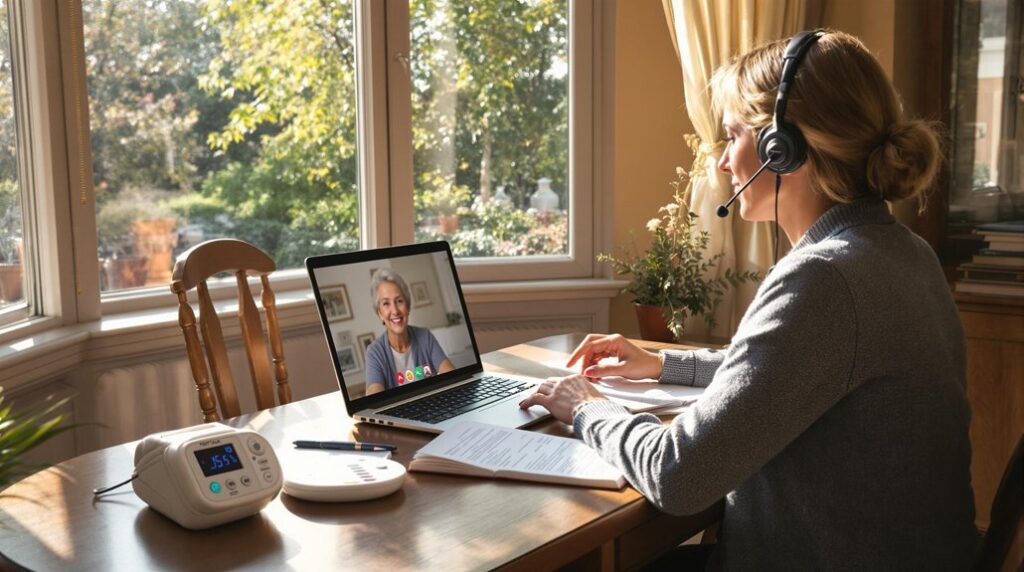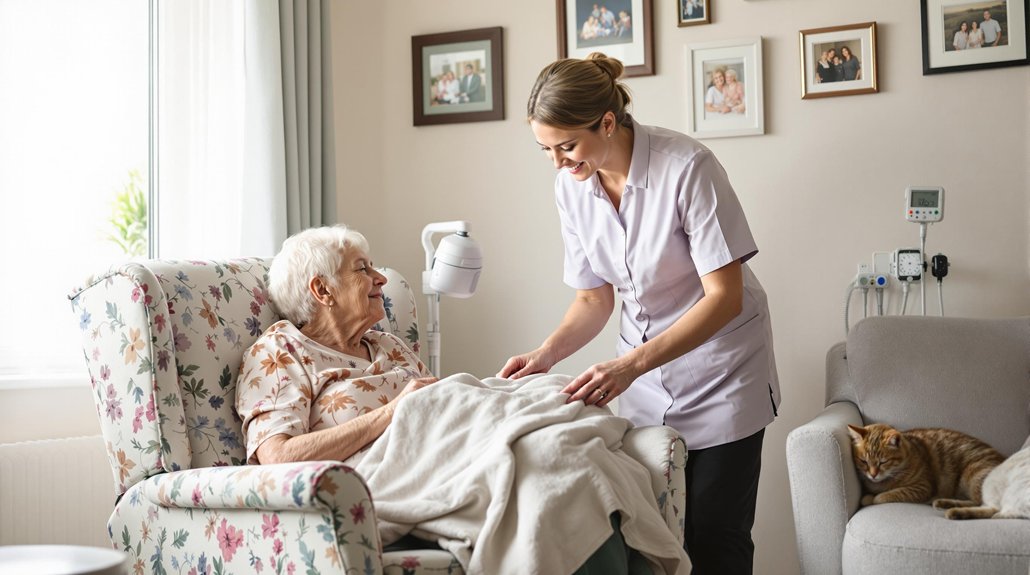Yes, you can work as a caregiver from home through various remote positions like care coordinator, virtual health monitor, or online consultant. You’ll need essential tools including high-speed internet, medical monitoring apps, and reliable communication software to provide quality care. With proper scheduling and a well-equipped home office, you can balance work responsibilities while supporting your clients. The right setup and support systems will help you succeed in this growing field.
Types of Remote Caregiving Jobs and Opportunities
While the traditional caregiving role typically involves in-person support, numerous remote opportunities now allow caregivers to work from home.
You can explore positions as a remote care coordinator, managing client schedules and coordinating services for multiple families. Through telehealth services, you might work as a virtual health monitor, tracking patients’ essential signs and medication adherence using digital tools.
Virtual companionship has emerged as another viable option, where you’ll provide emotional support and social interaction to seniors or individuals with disabilities via video calls.
You can also pursue roles as an online caregiver consultant, offering guidance to family caregivers who need support managing their responsibilities. Additionally, some insurance companies hire remote case managers to assess care needs and develop extensive care plans for their clients.
Quality assurance measures are essential for remote caregivers to maintain the same high standards of care provided in traditional in-home settings.
Essential Tools and Technology for Virtual Caregiving
Because virtual caregiving relies heavily on digital solutions, having the right tools and technology is crucial for success. You’ll need reliable hardware and software to effectively communicate with clients and healthcare providers through telehealth platforms and digital communication channels. Clinical assessments and monitoring are conducted regularly by licensed nurses to ensure optimal care outcomes while leveraging virtual tools.
| Crucial Tool | Purpose |
|---|---|
| High-speed internet | Guarantees smooth video calls and data transfer |
| Webcam/smartphone | Enables visual monitoring and face-to-face interaction |
| Medical monitoring apps | Tracks essential signs and medication schedules |
| Digital calendar | Manages appointments and care routines |
| Communication software | Facilitates secure messaging and file sharing |
Consider investing in noise-canceling headphones and a dedicated workspace setup to maintain professionalism during virtual sessions. You’ll also want to familiarize yourself with HIPAA-compliant platforms to protect your clients’ privacy and maintain regulatory compliance in your caregiving practice.
Creating a Balanced Schedule Between Work and Care
Striking the right balance between professional responsibilities and caregiving duties requires thoughtful planning and clear boundaries. You’ll need to establish designated work hours while ensuring your loved one receives consistent care throughout the day.
Start by creating blocks of time for focused work, caregiving tasks, and essential self care. Schedule the most demanding work projects during periods when your care recipient is most independent or resting.
Balance work and care by scheduling demanding tasks during your loved one’s rest periods and creating structured time blocks.
Use time management tools to track both work deadlines and care routines, helping you stay organized and reduce stress. Remember to build in buffer time between activities to handle unexpected situations.
When possible, coordinate with other family members or respite care services to cover caregiving duties during important work meetings or high-priority tasks. This structured approach helps maintain professional productivity while providing quality care.
Consider implementing medication management strategies to ensure treatment adherence while maintaining your work schedule.
Setting Up Your Home Office as a Remote Caregiver
Since you’ll be spending significant time working and providing care in the same space, creating an efficient home office setup is essential for success as a remote caregiver.
Select a quiet area that allows you to maintain visual contact with your care recipient while staying focused on work tasks.
Your home office essentials should include a comfortable chair, adjustable desk, and proper lighting to prevent strain during long hours.
Implement smart workspace organization with filing systems and storage solutions that keep important documents, medical records, and work materials within easy reach.
Consider installing a video monitor or using a baby monitor to check on your loved one while working.
Add personal touches like family photos or plants to create a positive environment that supports both your caregiving and professional responsibilities.
Having specialized care services available ensures you can maintain professional standards while providing tailored support for conditions like Parkinson’s or post-operative care.
Building Support Systems and Emergency Plans
While a well-organized home office supports your daily routine, having robust support systems and emergency plans can make the difference between managing challenges and feeling overwhelmed.
Start by creating a list of emergency contacts, including backup caregivers, healthcare providers, and family members who can step in when needed.
Build strong support networks by connecting with other caregivers through online forums, local support groups, or professional associations. You’ll find valuable insights, emotional support, and practical advice from those who understand your situation.
Consider joining caregiver advocacy organizations that offer resources and training opportunities.
Our Care Plan Assessment services include comprehensive evaluations to help establish effective emergency protocols and support systems for home-based caregivers.
Develop clear protocols for various scenarios, such as medical emergencies or technology failures. Keep important documents, medication lists, and care instructions easily accessible, and make certain your support team knows where to find them.
Managing Client Relations in Remote Caregiving
When caregiving remotely, maintaining strong client relationships requires clear communication and consistent professionalism. You’ll need to establish effective communication strategies that keep you connected with clients and their families throughout the day.
Set up regular check-ins via phone, video calls, or secure messaging platforms to guarantee everyone stays informed about care plans and daily progress.
Focus on client engagement by being proactive in addressing concerns and anticipating needs before they become issues. Document all interactions thoroughly and share updates with family members as appropriate.
Make yourself available during agreed-upon hours and respond promptly to messages. Remember to maintain professional boundaries while still showing empathy and understanding.
Your ability to balance accessibility with structure will help build trust and guarantee successful remote caregiving relationships.
Conclusion
Remote caregiving is possible and rewarding, just like caring for someone in person. You can help others from home in many ways – checking on their health through video calls, organizing their care plans, or simply being a friendly voice to talk to. Picture yourself making a real difference in someone’s life while working in a way that fits your own needs and schedule. You’re not alone in wanting to provide care while balancing your personal life – many caregivers successfully do this every day. With today’s technology and the right support, you can build a meaningful career helping others from home. Focus Family Care is here to guide you every step of the way.
If you or a loved one need help, don’t wait. Reach out to Focus Family Care today at (561) 693-1311 or email us at info@focusfamilycare.com.




